Corpora quadrigemina
In the brain, the corpora quadrigemina (Latin for "quadruplet bodies") are the four colliculi—two inferior, two superior—located on the tectum of the dorsal aspect of the midbrain. They are respectively named the inferior and superior colliculus.
| Corpora quadrigemina | |
|---|---|
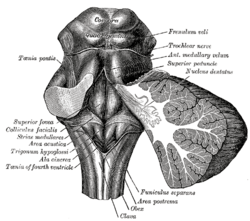 Rhomboid fossa. ("Corpora quadrigemina" visible at top). | |
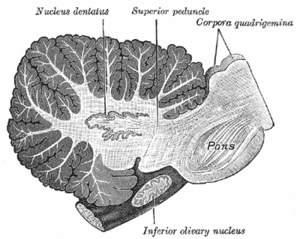 Sagittal section through right cerebellar hemisphere. The right olive has also been cut sagittally. ("Corpora quadrigemina" visible at upper right). | |
| Identifiers | |
| NeuroNames | 1279 |
| FMA | 242157 |
| Anatomical terms of neuroanatomy | |
The corpora quadrigemina are reflex centers involving vision and hearing. It consists of groups of nerve cells-grey matter scattered in white matter. It basically connects the forebrain and the hind brain. It has four corpora quadrigemina which are the reflex centres of eye movement and auditory responses. The superior part of corpora quadrigemina are called superior colliculi, and inferior part as inferior colliculi.[1]
Additional images
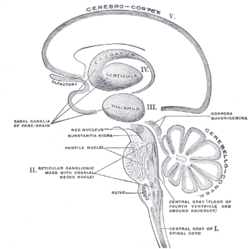 Schematic representation of the chief ganglionic categories (I to V).
Schematic representation of the chief ganglionic categories (I to V).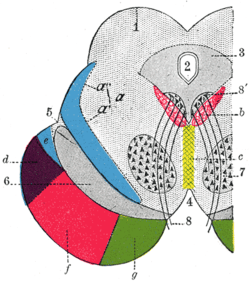 Transverse section through mid-brain.
Transverse section through mid-brain.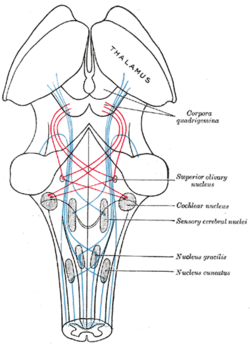 Scheme showing the course of the fibers of the lemniscus; medial lemniscus in blue, lateral in red.
Scheme showing the course of the fibers of the lemniscus; medial lemniscus in blue, lateral in red.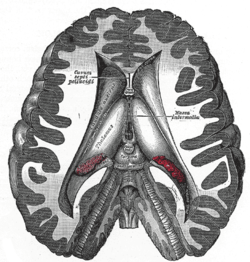 Dissection showing the ventricles of the brain.
Dissection showing the ventricles of the brain.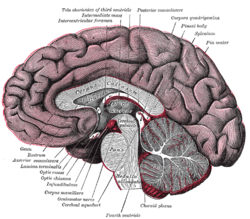 Median sagittal section of brain.
Median sagittal section of brain.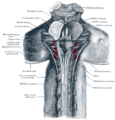 Upper part of medulla spinalis and hind- and mid-brains; posterior aspect, exposed in situ.
Upper part of medulla spinalis and hind- and mid-brains; posterior aspect, exposed in situ.
gollark: This sort of thing makes natural languages quite annoying, but you can help by, well, not picking the most emotionally charged word which "technically matches".
gollark: If I say "that person is a criminal" you might very well have a worsened opinion of them, even if I know that all they actually did was jaywalking or something. It's technically not *false* to call them that but misleads.
gollark: Using a word which is technically right by a dictionary definition can be misleading because it has connotations which possible alternate choices of word don't.
gollark: They are important. Words aren't clear cut definitions like, say, mathematical objects, and the dictionary just points to some common uses.
gollark: Great!
External links
References
- Marieb, Elaine N. Essentials of Human Anatomy & Physiology. 6th ed. San Francisco: Daryl Fox, 2000. 210.
This article is issued from Wikipedia. The text is licensed under Creative Commons - Attribution - Sharealike. Additional terms may apply for the media files.